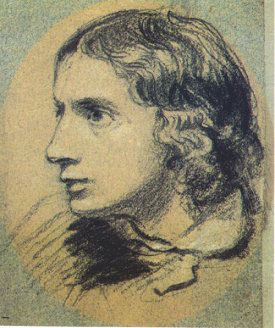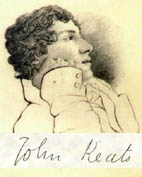John Keats
(1795 - 1821)

Keats is the first entire artist in word and rhythm in English poetry,
— not grandiose, classical and derived like Milton,
but direct and original in his artistry, he begins a new era.
SRI AUROBINDO
from Endymion
A thing of beauty is a joy for ever:
Its loveliness increases; it will never
Pass into nothingness; but still will keep
A bower quiet for us, and a sleep
Full of sweet dreams, and health, and quiet breathing.
Therefore, on every morrow, are we wreathing
A flowery band to bind us to the earth,
Spite of despondence, of the inhuman dearth
Of noble natures, of the gloomy days,
Of all the unhealthy and o’er-darkened ways
Made for our searching: yes, in spite of all,
Some shape of beauty moves away the pall
From our dark spirits. Such the sun, the moon,
Trees old and young, sprouting a shady boon
For simple sheep; and such are daffodils
With the green world they live in; and clear rills
That for themselves a cooling covert make
’Gainst the hot season; the mid forest brake,
Rich with a sprinkling of fair musk-rose blooms:
And such too is the grandeur of the dooms
We have imagined for the mighty dead;
All lovely tales that we have heard or read:
An endless fountain of immortal drink,
Pouring unto us from the heaven’s brink.
Nor do we merely feel these essences
For one short hour; no, even as the trees
That whisper round a temple become soon
Dear as the temple’s self, so does the moon,
The passion poesy, glories infinite,
Haunt us till they become a cheering light
Unto our souls, and bound to us so fast,
That, whether there be shine, or gloom o’ercast;
They always must be with us, or we die.
Therefore, ’tis with full happiness that I
Will trace the story of Endymion.
The very music of the name has gone
Into my being, and each pleasant scene
Is growing fresh before me as the green
Of our own valleys: so I will begin
Now while I cannot hear the city’s din;
Now while the early budders are just new,
And run in mazes of the youngest hue
About old forests; while the willow trails
Its delicate amber; and the dairy pails
Bring home increase of milk. And, as the year
Grows lush in juicy stalks, I’ll smoothly steer
My little boat, for many quiet hours,
With streams that deepen freshly into bowers.
Many and many a verse I hope to write,
Before the daisies, vermeil rimm’d and white,
Hide in deep herbage; and ere yet the bees
Hum about globes of clover and sweet peas,
I must be near the middle of my story.
O may no wintry season, bare and hoary,
See it half finish’d: but let Autumn bold,
With universal tinge of sober gold,
Be all about me when I make an end.
And now, at once adventuresome, I send
My herald thought into a wilderness:
There let its trumpet blow, and quickly dress
My uncertain path with green, that I may speed
Easily onward, thorough flowers and weed.
[I.1-62]
Sri Aurobindo’s remarks:
«...solitary thinkings; such as dodge
Conception to the very bourne of heaven,
Then leave the naked brain.
The substance of these lines of Keats is of the highest kind and the expression is not easily surpassable, and even as regards the plane of their origin it is above and not below the boundary of the overhead lines.»
«The real soul of Keats, his inner genius, the thing he was striving to bring out of himself […] lay in that attempt which, first failing in Endymion, was again resumed in Hyperion. It was the discovery of the divine Idea, Power and living norm of Beauty which by its breath of delight has created the universe, supports it and moves towards a greater perfection, inspires the harmonies of inward sight and outward form, yearns and strives towards the fullness of its own self-discovery by love and delight. Not yet in possession of his idea, he tries to find and to figure it in Endymion by sensuous images of a rich and dim moonlit dream with a sort of allegory or weft of symbols behind the words and the thoughts, but his hand is still inexpert and fails in the execution. In Hyperion the idea is clearer and in bolder relief, but it is misconceived under a too intellectual, external and conventionally epic Miltonic influence, and in his second version he turns not quite happily to a renewal of the form of his first attempt. He has found a clue in thought and imagination, but not quite its realisation in the spiritual idea, has already its imaginative, sensuous, something of its intellectual suggestion, but not yet what the spirit in him is trying to reveal, its mystically intellectual, mystically sensuous, mystically imaginative vision, form and word. The intimation of it in his work, his growing endeavour to find it and the unfulfilled promise of its discovery and unique fullness of expression are the innermost Keats and by it he belongs in spirit to these prophetic, but half-foiled singers of the dawn. He lives more than any other poet in the very temple of Beauty, traverses its sculptured and frescoed courts with a mind hued and shaped to her forms and colours and prepares, but is never permitted, to enter the innermost sanctuary.»
from Hyperion
Deep in the shady sadness of a vale
Far sunken from the healthy breath of morn,
Far from the fiery noon, and ave’s one star,
Sat gray-hair’d Saturn, quiet as a stone,
Still as the silence round about his lair;
Forest on forest hung above his head
Like cloud on cloud. No stir of air was there,
Not so much life as on a summer’s day
Robs not one light seed from the feather’d grass,
But where the dead leaf fell, there did it rest.
A stream went voiceless by, still deadened more
By reason of his fallen divinity
Spreading a shade: the Naiad ’mid her reeds
Press’d her cold finger closer to her lips.
Along the margin-sand large foot-marks went,
No further than to where his feet had stray’d,
And slept there since. Upon the sodden ground
His old right hand lay neverless, listless, dead,
Unsceptred; and his realmless eyes were closed;
While his bow’d head seem’d list’ning to the Earth,
His ancient mother, for some comfort yet.
[I.1-21]

